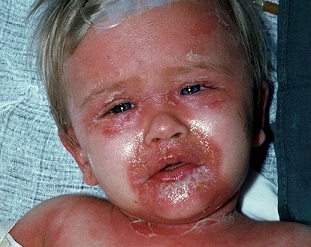COVID-19 News: Peer Reviewed Study Shows Pfizer’s COVID-19 Jabs Affect Immunity In Children, Making Them Susceptible To Other Pathogenic Infections!
Nikhil Prasad Fact checked by:Thailand Medical News Team Sep 04, 2023 2 years, 5 months, 3 days, 2 hours, 12 minutes ago
Australian Study Alarmingly Found That SARS-CoV-2 mRNA-Based Vaccine Alters Heterologous Immunity In Children And That These Effects Can Persist Up To Six Months After Vaccination! The Study Found That BNT162b2 COVID-19 Vaccination In Children Alters Cytokine Responses To Heterologous Pathogens And Toll-Like Receptor Agonists!
COVID-19 News: The Pfizer-BioNTech COVID-19 vaccine, known as BNT162b2, has been claimed to be a critical tool in the global effort to combat the COVID-19 pandemic. While its ‘efficacy’ and ‘safety profile’ have been well-documented in adults in various cases studies, research,
COVID-19 News reports and even adverse effects reporting platforms, the vaccination of children has raised important questions about the impact of these vaccines on their immune systems.
 Child Infected With Staphylococcus Aureus
Child Infected With Staphylococcus Aureus
A recent peer-reviewed study conducted by researchers from the Murdoch Children's Research Institute, Victoria, Australia, The Royal Children's Hospital, Melbourne, Australia, and the University of Melbourne, Australia, sheds light on a concerning aspect of the COVID-19 vaccination in children.
Alarmingly, the study findings reveal that the Pfizer COVID-19 vaccine alters heterologous immunity in children, making them potentially more susceptible to other pathogenic infections!
Already past reports have also showed that just COVID-19 infections can also affect the innate immune system of children, making them also susceptible to other pathogens.
https://www.thailandmedical.news/news/covid-19-news-charlatans-promoting-immunity-debt-for-rise-in-pediatric-viral-infections!-sars-cov-2-destroying-children-s-robust-innate-system-is-the-
https://www.thailandmedical.news/news/warning-newer-sars-cov-2-variants-have-evolved-to-overcome-the-robust-innate-immune-system-of-children-infants-and-children-are-more-vulnerable-now
Heterologous Effects of Vaccines
Vaccines have long been known to provide protection not only against the targeted pathogen but also against unrelated infections. These off-target, or heterologous, effects are crucial in enhancing the overall immune response and protecting individuals from a broader range of diseases. These effects have been particularly pronounced in live-attenuated vaccines, which have been associated with reductions in all-cause infant mortality beyond what can be attributed to the vaccine's specific protection.
One proposed mechani
sm behind these heterologous effects is trained immunity, a process through which innate immune cells, like monocytes, develop immunological memory through metabolic and epigenetic changes. Understanding and harnessing the positive heterologous effects of vaccines hold the potential to extend protection against a variety of pathogens.
COVID-19 Vaccination and Heterologous Effects in Children
The COVID-19 pandemic has prompted a renewed interest in the heterologous effects of vaccines, including the BCG vaccine. Previous studies have explored heterologous effects by assessing in vitro cytokine responses to heterologous antigens, but research in this area has primarily focused on adults. The study we are discussing today is the first to investigate the immunological heterologous effects of COVID-19 vaccination in children.
Study Design and Findings
The study involved 29 children aged 5-11 years who were administered two doses of the Pfizer-BioNTech COVID-19 vaccine. Blood samples were collected before vaccination and 28 days after the second dose. Additionally, eight children had samples analyzed six months after vaccination.
The findings of the study are as follows:
-
Decreased Immune Responses to Heterologous Stimulants: One month after vaccination (V2 + 28), the children exhibited decreased interferon-γ and monocyte chemoattractant protein-1 responses to various heterologous pathogens and Toll-like receptor agonists, including bacteria such as Staphylococcus aureus, Escherichia coli, and Listeria monocytogenes, and viral antigens like hepatitis B. This suggests that the Pfizer COVID-19 vaccine had a dampening effect on their immune responses to these unrelated pathogens.
-
Sustained Decrease in Viral Immune Responses: Six months after vaccination, there were sustained decreases in cytokine responses to viral stimulants but not bacterial stimulants. This implies that the alteration of the immune response persisted over an extended period when it came to viruses.
-
Enhanced Immune Response to SARS-CoV-2: Conversely, the study found that cytokine responses to SARS-CoV-2-specific stimuli, including spike glycoprotein subunits S1 and S2, were increased at V2 + 28 and remained higher than pre-vaccination responses six months after vaccination.
-
No Correlation with Vaccine-Specific Antibodies: Importantly, the study found no correlation between the level of anti-SARS-CoV-2-receptor binding domain IgG antibodies and the altered cytokine responses induced by the vaccine. This suggests that the observed changes in immune responses were not linked to the specific antibody response to the vaccine.
Implications and Concerns
The results of this study raise important concerns regarding the Pfizer COVID-19 vaccine's impact on children's immune systems. The altered immune responses to heterologous pathogens, particularly the reduced responses to bacteria, may render vaccinated children more susceptible to bacterial infections.
Furthermore, the study highlights the need for further research into the long-term consequences of these altered immune responses. While the vaccine appears to enhance immunity against SARS-CoV-2, it may come at the cost of diminished immunity against other pathogens. This has significant public health implications, especially in settings where children are regularly exposed to a wide range of microbes, such as schools and daycare centers.
Conclusion
The peer-reviewed study on the Pfizer COVID-19 vaccine's effects on children's immune responses underscores the importance of thoroughly understanding the impact of vaccines, especially in pediatric populations. While these vaccines have been claimed to have played a crucial role in controlling the spread of COVID-19, their potential implications on heterologous immunity cannot be ignored.
Further research is needed to assess the clinical consequences of these findings and guide vaccination policies, taking into account the broad spectrum of public health implications. Balancing the benefits and potential risks of COVID-19 vaccination in children remains a complex and evolving challenge in the ongoing battle against the pandemic.
The study findings were published in the peer reviewed journal: Frontiers In Immunology.
https://www.frontiersin.org/articles/10.3389/fimmu.2023.1242380/full
For the latest
COVID-19 News, keep on logging to Thailand Medical News.
Read Also:
https://www.thailandmedical.news/news/covid-19-news-severe-covid-19-induces-long-term-changes-in-the-innate-immune-system:-unveiling-the-underlying-mechanisms
https://www.thailandmedical.news/news/breaking-news-even-asymptomatic-sars-cov-2-infections-cause-dna-methylation-and-epigenetic-changes,-leading-to-immune-dysregulation
https://www.thailandmedical.news/news/proteomics-study-reveals-that-sars-cov-2-dysregulates-the-innate-immune-responses-by-downregulating-fetuin-a,-tetranectin-and-paraoxonase-1-
https://www.thailandmedical.news/news/covid-19-immunology:-how-sars-cov-2-infections-damage-the-immune-system
https://www.thailandmedical.news/news/covid-19-news-study-discovers-that-sars-cov-2-orf8-protein-exhibits-complement-inhibitory-properties-and-damages-innate-immunity
https://www.thailandmedical.news/news/covid-19-news-imperial-college-london-study-shows-that-sars-cov-2-causes-monocytes-from-the-innate-immune-system-to-become-dysfunctional
https://www.thailandmedical.news/news/covid-19-research-study-finds-that-sars-cov-2-orf3c-protein-localizes-to-mitochondria,-inhibiting-innate-immunity-by-restricting-ifn-%CE%92-production
https://www.thailandmedical.news/news/new-study-by-cornell-university-shows-sars-cov-2-causes-epigenetic-changes-to-innate-immune-cells-and-their-progenitors,-contributing-to-long-covid
https://www.thailandmedical.news/news/covid-19-immunology-yet-another-study-shows-that-sars-cov-2-suppresses-human-host-innate-immunity
https://www.thailandmedical.news/news/strep-a-news-invasive-group-a-strep-igas-infections-increasing-globally-19-pediatric-deaths-in-uk,-2-in-us-and-2-in-canada-with-thousands-infected
